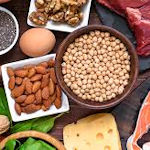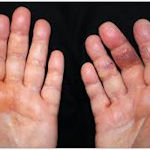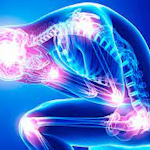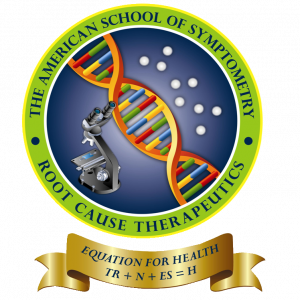
Dr. Maxwell Nartey
Professor of Symptometric Science, American School of Symptometry, NFP
Hippocrates, “Father of Western medicine”, recommended that food should be our medicine, and medicine should be our food. Did he deconstruct food to know what it really is? No, he did not. Did he know that food is a slow killer, and poisoned food or contaminated food is a fast killer? No, he did not, and yet he recommended what he knew absolutely nothing about. Unfortunately, people believed him, and today, the world is a complete mess because of the teachings of Hippocrates. Here are more facts to consider.
Of the five food groups, none will be safe to eat unless the necessary precautions have been taken. What are these precautions?
First, food must be selected scientifically so that only the foods that release less negative energy should be cooked or eaten.
Second, we must produce the different categories of enzymes to digest starch, sugar, protein, fat and oil so that no residues would be left in the blood stream.
Third, we must produce ancillary enzymes to liquefy all the preservatives that are in the vaccines, and in processed foods. Then, we must produce another set of ancillary enzymes to liquefy plant alkaloids and the pollutants that we inhale so that our lungs will continue to be healthy.
Who is helping the world to produce these enzymes? No one except Symptometry. This discussion will focus on proteins, and on the enzymes that are needed to thoroughly digest protein foods.
Proteins
A protein is a nitrogenous food.
There is dairy protein (milk and cheese). The other sources of protein are: eggs, meat, fish, nuts, seeds, scavengers like shrimp, lobsters, crabs, clams, snails, etc.; and legumes (beans, lentils, etc.). Plant proteins are made of cellulose, and animal protein, which includes humans, is made of collagen.
Nut protein intermingles with minerals, saturated fat and a very poisonous acid called hydrocyanic acid aka prussic acid. Egg protein (ovalbumin) intermingles with saturated fat, avidin and phosphoprotein. Dairies intermingle with lactose, saturated fat, amino acids, and phosphoprotein. Meat protein, poultry protein and fish protein intermingle with saturated fat, minerals, amino acids, and sometimes animal diseases..
Legume protein intermingles with amino acids, sometimes legume diseases, oligosaccharides, minerals, oil, and sparteine. Sparteine is the alkaloid that destroys red blood cells to cause chronic anemia. Soy protein intermingles with amino acids, minerals, and saturated fat, as well as genistein and daidzein, the hormone destabilizers.
Here is what else must be known about avidin in eggs. It blocks the integration of biotin into every human enzyme, thereby making human enzymes worthless. All the vaccines that are cultured in eggs have avidin. Avidin is like oxygen in water. Oxygen can never be removed from water. Some scientists tried to remove avidin from ovalbumin, they failed. Avidin is not like caffeine that can be removed from coffee and tea. It is ingrained and unremovable.
Considering the above, does the person who wants to eat a source of protein also weigh the pros and cons of sparteine, avidin, prussic acid, etc., before eating the foods that have these health disruptors, or they just want to fill their bellies? Most individuals just fill their bellies.
All protein foods mostly consist of amino acids, but these amino acids are locked so tight that they will not be released without smashing the hydrogen bonds that are holding them hostage.
We must eat food because food supplies the nutrients that must be oxidized to give us energy, but we were never told that in order to get food to release nutrients for oxidation or combustion, we must first produce two kinds of enzymes.
Do people know what it takes to produce enzymes to digest starch, sugar, fat, oil, or protein? No, they do not. They just eat food to fill their bellies. Our parents just ate food to fill their bellies; their parents and grandparents did likewise; their ancestors had the same habit, and now, most of us acquired this bad habit of not weighing the pros and cons of foods before eating them.
It is now time to use scientific enlightenment to put an end to bad eating habits, and allow our minds to satisfy the needs of our cells, starting with the production of the enzymes to digest proteins.
Enzymes that digest proteins
Protein digestion begins in the stomach, not in the mouth.
Our stomach must produce the enzyme called pepsin to smash the hydrogen bonds of the protein food we eat. The protein that is released after breaking its hydrogen bonds must undergo proteolysis. Proteolysis is the process where protein is broken into smaller protein units. It is the pancreas that releases trypsin, chymotrypsin and carboxypeptidase to carry out proteolysis.
What will the poisons like prussic acid, cyanide, solanine and sparteine do to the process of proteolysis? They will block it. This is why individuals who want their cells to continue to perform proteolysis should devise a method to neutralize sparteine and other poisons. If nothing is blocking proteolysis, smaller protein units will be available after proteolysis.
After proteolysis, the cells will then collectively produce the enzyme called proteinase. It is proteinase that will perform hydrolysis on the small protein units.
Hydrolysis is the process where the cells produce the enzyme called hydrolase. As the cells add water atoms to the smaller protein units, hydrolase is accelerating the conversion of these small protein units to peptides, dipeptides, tripeptides, tetrapeptides and polypeptides. This is how the protein we ate is turned into different peptides. Various organs will then use some of these peptides to produce brain essentials and body essentials. Manganese salt will be produced to coat these peptides so that they last longer.
The last enzyme the cells must produce is called protease. The liver will use protease to convert the peptides from essential amino acids to hundreds of non-essential amino acids.
For example, phenylalanine is an essential amino acid, which means our body does not produce it. We must get it from specific foods. It is the liver that will use protease to convert phenylalanine to the amino acid called tyrosine.
Then, the pineal gland will use tyrosine to produce serotonin and melatonin; the brain cells will use tyrosine to produce acetylcholine; the adrenal gland will use tyrosine to produce epinephrine and norepinephrine, and so on and so forth. If a protease inhibitor (a poison) blocks the conversion process, or the liver is swollen, congested or diseased, phenylalanine will not be converted to tyrosine. As a result, the person will not have serotonin, acetylcholine, norepinephrine, etc.
I have just described the various stages through which the protein foods we eat must go before our cells can use tyrosine to produce brain essentials and body essentials.
Another example is, prolactin. It takes 198 non-essential amino acids to produce the hormone called prolactin. Then, hundreds more non-essential amino acids would be needed to produce colostrum.
Therefore, a pregnant woman who does not have at least 500 non-essential amino acids in her pituitary gland will not produce colostrum and prolactin. As a result, she will not be able to produce breast milk for her baby. Aren’t there thousands of women who cannot produce breast milk to breastfeed their babies? Yes, there are. Unfortunately, they do not know why they cannot produce breast milk. They may have a protease inhibitor in their liver.
The sugar in milk called lactose, follows a totally different pathway called the lactose pathway. This is why it is particularly important to differentiate lactose from lactalbumin (milk protein).
To digest milk protein, the person must produce pepsin, proteolytic enzymes, proteinase, hydrolase and protease. Then, to digest lactose, their small intestine must produce the enzyme called lactase.
We often hear expressions like, “I am lactose intolerant, milk makes me sick, etc.”. The truth is, a person who suffers from lactose intolerance has a profound enzyme deficit. This deficit makes it impossible for them to produce lactase and five other enzymes to thoroughly digest milk protein and other dairy products.
Individuals who cannot digest meat should stop saying, “Meat is not good”. This also applies to those who cannot digest fish. They should rather be saying, they cannot produce five enzymes to thoroughly digest meat protein, fish protein or poultry protein, or they cannot produce enzymes to liquefy the animal hormones and antibiotics that are in most meats and poultry. This places the blame on them, not on meat, fish and poultry.
Symptometry formulated a method to neutralize the antibiotics and the hormones that are in meats and in poultry so that meat and poultry can be easily digested. Contact Symptometry for this formulation. Let me at this point switch the focus to protein diseases.
Protein diseases
The protein diseases are proteinuria, albuminuria and proteinosis.
Proteinuria is the diagnosis of a person who has a lot of protein residues in their urine. If they have been producing the five different enzymes to thoroughly digest protein, their kidneys would have filtered their blood so well that no protein residues would be found in their urine.
There have been instances where individuals had so many protein residues in their glomeruli that their kidneys could not efficiently filter their blood. If the kidneys cannot properly filter blood, serum creatinine will be high and GFR (glomerular filtration rate) will be extremely low.
Many individuals went on dialysis because their GFR was below 10, and their creatinine was 450. It turns out that they were suffering from nephrogenous proteinuria, renal proteinuria, and glomerular proteinuria.
Overflow proteinuria affects the red bone marrow. It shuts it down to cause cancer of the red bone marrow. This cancer is also known as multiple myeloma. There have also been instances where amyloidosis, not overflow proteinuria, caused multiple myeloma.
Albuminuria is the diagnosis of a person who has a lot of albumin (kind of protein) in their urine. The liver produces albumin to provide osmotic pressure throughout the body. Liver disease may cause a person to have albuminuria because their liver could not produce enzymes to convert polypeptide chains to albumin, and keep albumin in the system. Albumin is not supposed to be seen in sputum (spit), and in urine. If it is detected during urinalysis, it is an indication that the person has an underperforming liver, and he or she cannot thoroughly digest protein.
I had protein in my urine for many years. I asked physicians, “What causes protein in urine?” They told me, “You have cirrhosis, and this is one of the consequences of having cirrhosis”. Thanks to symptometric research, I now know the truth. It is not cirrhosis that makes a person to have protein in their urine.
A person has protein in their urine because they cannot produce five different enzymes to thoroughly digest proteins. What a difference knowledge makes.
Proteinosis is the diagnosis of a person who has a lot of protein residues in their organs, skin and muscles. These protein residues have replaced collagen, which is not normal. It is because protein residues have replaced collagen that the person cannot produce fresh muscle tissue, and they cannot repair their internal organs and their skin.
For example, people have bedsores, leg ulcers, ulcers between their toes, heel ulcers, stomatitis (mouth ulcers), purpura miliaris, petechiae, ulcers in their colons, ulcers on their cornea, in their urethra, anus, and so on and so forth. Thanks to this discussion, the underlying cause of these ulcers is no longer a mystery.
Unless the person who has proteinuria starts to produce protein-digesting enzymes again, it would be extremely difficult to stimulate granulation to cure their lesions, skin blotches, skin discoloration, ulcers, etc.
The enzyme problem of vegetarians and vegans
Vegetarians and vegans assume they eat healthily because they do not eat flesh food like fish, poultry and meat. They have a lot to learn about plants, and plant products. No product demineralizes human tissues faster than plant alkaloids, and plant diseases.
If a person were born into vegetarianism, their dietary preference would be understandable, but if they became vegetarians or vegans just because they could not, and still, cannot digest flesh food, they have a problem. Their problem is, they cannot produce five protein-digesting enzymes. Basically, they have been suffering from an enzymatic disorder for decades.
It is because vegans cannot digest meat, fish and poultry that they will not get animal collagen, the richest source of essential amino acids. Then, they will have protein diseases because they cannot produce enzymes, even the enzymes that thoroughly digest the plant-based foods they eat.
The blood analysis of every vegan who came to Symptometry for root-cause treatment was very disturbing. Their lab report confirmed that their kidneys and liver were struggling.
It is very disheartening that no one has told vegans and vegetarians that their lifestyle will never make them optimally healthy. They can have a long life by being marginally healthy. However, it must be emphasized that health should never be confused with or equated with longevity.
It is only a well-fortified cerebellum that facilitates aging and determines longevity. As long as the respiratory center, the vasomotor center and the cardiac center in the cerebellum keep functioning, the person will continue to live.
Health is different. It is a reward from our cells for satisfying their needs. Since I am discussing vegetarianism, let me focus on vegetables.
Plants have diseases just like humans. Plant pathology that is studied in many universities, confirms that plants do have plant diseases. Plant diseases are heat resistant.
Therefore, any person who eats a diseased vegetable, cooked or raw, will have complex diseases. Complex diseases are difficult to cure. They are difficult to cure because plant diseases graft themselves upon cancerous tissue, and upon the organs and the muscles that have protein residues (proteinosis), or starch residues (amyloidosis). Then, the plant disease and the human disease, both with damaged DNAs, will merge and lock themselves in place.
Locking a complex disease in place makes it extremely difficult to cure it. This is because too many layers of undesirables must be removed before the three-way communication involving the genes, DNA and the three RNAs can be restored. It may take years to restore this three-way communication, but most individuals want a quick fix, which may not be possible given the history of their diseases, and the level of cell neglect.
Vegans and vegetarians get their protein mostly from soy and from legumes. It is true that legume protein and soy protein require fewer pepsin, proteolytic enzymes, proteinase and protease than meat, which is good; but it equally true that legumes have a tough, poisonous, liquid, and heat-resistant alkaloid called sparteine.
Even after cooking beans or lentils for three hours, analysis shows that heat does not neutralize sparteine. Sparteine is in all legumes. Dyes can be removed, but poisons like sparteine cannot be removed unless they are oxidized.
What will sparteine do in a person after ingesting it? It will cause anemia because sparteine destroys the red blood cells. This explains why every legume eater ends up becoming anemic. Daidzein in soy does exactly what sparteine does, and worse. It destroys hormones.
The destruction of the red blood cells will cause hypoxia (lack of oxygen in the tissues), and nutrient loss. Vegans and vegetarians rely heavily on ferrous sulfate pills for iron. There is a downside to these pills. Here is the explanation.
The dangers of ferrous sulfate pills
Ferrous sulfate pills for iron can be the solution to anemia, at least temporarily. This is because blood tests will show that the person’s iron level is now normal. Unfortunately, the person who keeps popping ferrous sulfate will eventually suffer from the consequences of iron poisoning.
Iron poisoning will cause stasis (blood stagnation). Stasis will cause ulcers in the gastrointestinal tract, liver injury, metabolic acidosis, vomiting, purpura miliaris, and clotting anomalies. Clotting anomalies also include embolism, and thrombosis. Iron poisoning is one of the underlying causes of ulcerative colitis.
To reverse iron toxicity caused by ferrous sulfate, a better iron with three oxygen molecules, not two, must be taken under the supervision of a doctor of Symptometry. Then, to cure ulcers, granulation must take place, the blood vessels must be fortified, and coal tar derivatives must be oxidized. If the person has cancer, the cancer deposits must be hydrolyzed. Curing an ulcer or a lesion is not as easy as most people think.
© Copyright 2021, The American School of Symptometry, NFP. No part of this publication may be reproduced or transmitted in any form or by any means, electronic or mechanical, including photocopying, recording, or by any information storage and retrieval system without the written permission of The American School of Symptometry, NFP. Library of Congress copyright number Txu 1-621-370, Washington D.C.


 Previous Post
Previous Post Next Post
Next Post